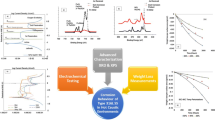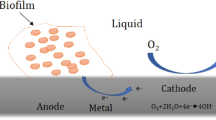Abstract
The corrosion behavior of unalloyed copper and aluminum alloy 2024 in modified Baar's medium has been studied with continuous reactors using electrochemical impedance spectroscopy. An axenic aerobic biofilm of either Pseudomonas fragi K or Bacillus brevis 18 was able to lessen corrosion as evidenced by a consistent 20-fold increase in the low-frequency impedance value of copper as well as by a consistent four- to seven-fold increase in the polarization resistance of aluminum 2024 after six days exposure compared to sterile controls. This is the first report of axenic aerobic biofilms inhibiting generalized corrosion of copper and aluminum. Addition of the representative sulfate-reducing bacterium (SRB) Desulfovibrio vulgaris (to simulate consortia corrosion behavior) to either the P. fragi K or B. brevis 18 protective biofilm on copper increased the corrosion to that of the sterile control unless antibiotic (ampicillin) was added to inhibit the growth of SRB in the biofilm.
Similar content being viewed by others
Author information
Authors and Affiliations
Additional information
Received: 24 May 1999 / Received revision: 6 July 1999 / Accepted: 1 August 1999
Rights and permissions
About this article
Cite this article
Jayaraman, A., Ornek, D., Duarte, D. et al. Axenic aerobic biofilms inhibit corrosion of copper and aluminum. Appl Microbiol Biotechnol 52, 787–790 (1999). https://doi.org/10.1007/s002530051592
Issue Date:
DOI: https://doi.org/10.1007/s002530051592




